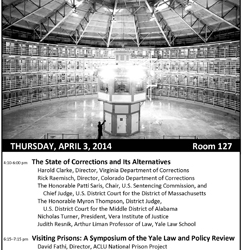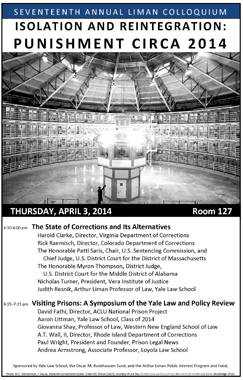Seventeenth Annual Liman Colloquium
Thursday, April 3, 2014
Yale Law School
Co-sponsored by the Arthur Liman Public Interest Program, the Oscar M. Ruebhausen Fund, and Yale Law School
Isolation and Reintegration: Punishment circa 2014
This colloquium explores how to reduce the isolation of prisoners, in terms of the manner and the degree to which correctional facilities rely upon separation of prisoners to maintain order, and the distances separating prisoners from their communities of origin and from society at large.
“As punishments become more cruel, so the minds of men, like fluids that always adjust their level according to the objects around them. . . . This is because one punishment obtains sufficient effect when its severity just exceeds the benefit the offender receives from the crime, and the degree of excess must be calculated precisely according to the damage to public good caused by the crime. Any additional punishment is superfluous and therefore a tyranny.”
Cesare Beccaria, ON CRIMES AND PUNISHMENTS 69-70 (XXVII, The Mildness of Punishment) (5th ed. Trans. Graeme R. Newman & Pietro Marongui, 2009, republishing 1754 edition).
“The general object which all laws have, or ought to have, in common, is to augment the total happiness of the community; and therefore, in the first place, to exclude, as far as may be, every thing that tends to subtract from that happiness: in other words, to exclude mischief. But all punishment is mischief: all punishment in itself is evil. Upon the principle of utility, if it ought at all to be admitted, it ought only to be admitted in as far as it promises to exclude some greater evil.”
Jeremy Bentham, AN INTRODUCTION TO THE PRINCIPLES OF MORALS AND LEGISLATION, paras.1-2 (VII, Cases Unmeet for Punishment) (1822).
In centuries past, reformers such as Cesare Beccaria and Jeremy Bentham offered what were then radically new conceptions of punishment. Today’s conditions invite comparably ambitious aspirations to reframe the practices of punishment in the twenty-first century, even as Bentham’s proposed Panopticon stands as a reminder that one generation’s efforts at improvements may come to be challenged by the next.
3-4 pm Registration Faculty Dining Room
4:10-6 pm The State of Corrections and Its Alternatives Room 127
This panel brings together individuals, all focused on sentencing and corrections and coming from different sectors, to address how to change current patterns of incarceration.
Harold Clarke, Director, Virginia Department of Corrections
Rick Raemisch, Director, Colorado Department of Corrections
The Honorable Patti Saris, Chair, U.S. Sentencing Commission, and Chief Judge, U.S. District Court, District of Massachusetts
The Honorable Myron Thompson, District Judge, U.S. District Court, District of Alabama
Nicholas Turner, President, Vera Institute of Justice
Moderator: Judith Resnik, Arthur Liman Professor of Law, Yale Law School
6:15–7:15 pm Visiting Prisons: A Symposium of the Yale Law and Policy Review
This session explores the regulation, operation, and impact of prison visits. Panelists will draw on and respond to the fifty-state survey of visiting policies that the Liman Program undertook with the assistance of the Association of State Correctional Administrators (ASCA); their essays will be published in a special issue of the Yale Law and Policy Review.
David Fathi, Director, ACLU National Prison Project
Aaron Littman, Yale Law School, Class of 2014
Giovanna Shay, Professor of Law, Western New England School of Law
A.T. Wall, II, Director, Rhode Island Department of Corrections, and
President, Association of State Corrections Administrators
Paul Wright, President and Founder, Prison Legal News
Moderator: Andrea Armstrong, Associate Professor, Loyola Law School



